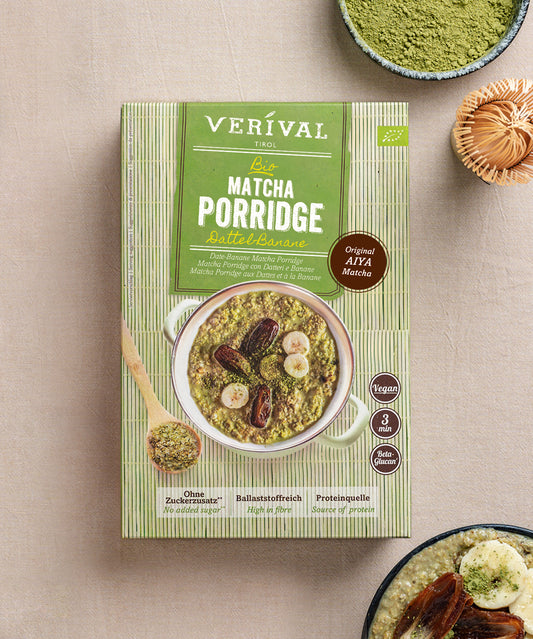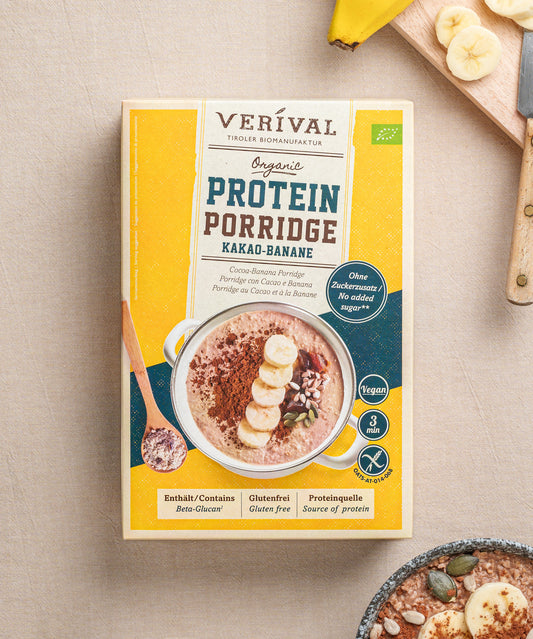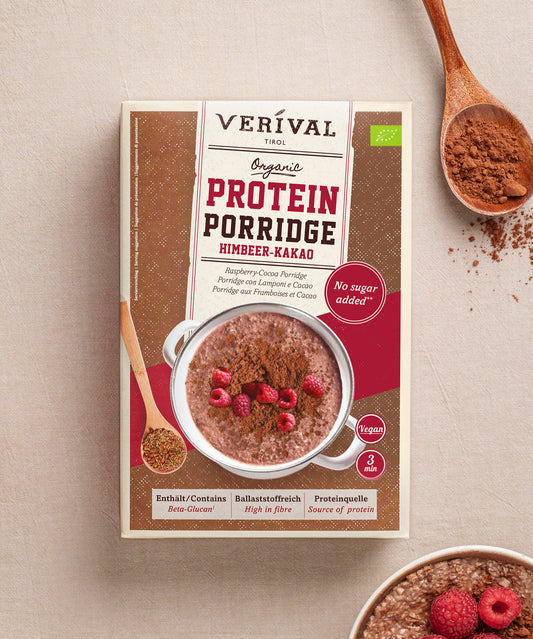The importance of the gut for our well-being is increasingly becoming the focus of research. Nutrition and the microbiome are closely related to the function of the intestinal barrier. If it becomes more permeable, this is referred to as leaky gut. With the right choice of foods, you can support your intestinal flora and strengthen the mucous membrane.
Verival Organic Breakfast – Try it now
Fibre-rich foods – food for good gut bacteria
Fibre is one of the most important nutrients for healthy digestion and a stable microbiome. It serves as a food source for beneficial gut bacteria and promotes the formation of short-chain fatty acids such as butyrate, acetate and propionate, which supply the intestinal mucosa with energy, inhibit inflammation and stabilise the so-called tight junctions. These are protein compounds between the cells of the intestinal mucosa that act as a barrier and control which substances are allowed to pass from the intestine into the bloodstream.
Regular consumption of fibre-rich foods can help promote the balance of the intestinal flora and strengthen the barrier function. The following are particularly recommended:
- Oats: contain soluble fibre such as beta-glucans, which promote the growth of beneficial bacteria and have an anti-inflammatory effect.
- Whole grains such as spelt, rye, millet or quinoa: provide long-chain carbohydrates and minerals that stimulate intestinal activity.
- Legumes such as lentils, beans or chickpeas: are rich in resistant starch, which acts as a prebiotic and supports the diversity of the microbiome.
It is important to increase fibre intake slowly and drink enough fluids so as not to overwhelm the digestive system. This allows the intestinal flora and mucous membrane to gradually adjust to the increased amount.
Fermented foods – for a diverse intestinal flora
A diverse intestinal flora is crucial for the stability of the intestinal barrier. Fermented foods contain live microorganisms such as lactic acid bacteria, which have a positive effect on the microbiome and can suppress pathogenic germs.
Consumed regularly, they can help promote microbial diversity, regulate inflammatory processes and strengthen the immune system in the gut. Particularly valuable are:
- Yoghurt with active cultures, ideally unsweetened and natural
- Kefir, a fermented milk drink with a variety of probiotic strains.
- Sauerkraut and kimchi are rich in lactic acid bacteria; when raw and unpasteurised, the microorganisms remain completely intact.
- Kombucha is a fermented tea that can be consumed in moderation.
Regularity is important: small amounts of fermented products spread throughout the day are often better tolerated than large portions at once.
Healthy fats – building blocks for the intestinal barrier
Fatty acids are important components of cell membranes, including those of the intestinal mucosa. An adequate intake of high-quality fats supports the formation and regeneration of these cells.
Unsaturated fatty acids and omega-3 fatty acids are particularly valuable as they have anti-inflammatory properties and can promote barrier function. The best sources include:
- Nuts such as walnuts and almonds: provide unsaturated fatty acids, vitamin E and antioxidants.
- Seeds such as flaxseed, chia seeds or hemp seeds: contain alpha-linolenic acid, a plant-based omega-3 fatty acid.
- Vegetable oils such as linseed oil, olive oil and rapeseed oil: support cell health and contain antioxidant polyphenols.
Fats are best consumed in their natural form or cold-pressed to preserve heat-sensitive nutrients. A balanced fat intake contributes to the stability of the intestinal mucosa and can reduce inflammatory reactions in the body.
Vegetables and berries – antioxidants for cell protection
Vegetables and fruit, especially berries, provide a variety of vitamins, minerals and secondary plant substances that are essential for intestinal health. These bioactive substances have antioxidant and anti-inflammatory effects, protect cells from oxidative stress and support mucosal regeneration.
The following are particularly recommended:
- Green vegetables such as broccoli, spinach and kale; vegetables that are rich in antioxidants and chlorophyll.
- Root vegetables such as carrots and celery provide soluble fibre and beta-carotene.
- Bitter substances from chicory, endive or artichokes stimulate digestion and promote bile flow.
- Berries such as blueberries, raspberries, blackberries and currants. They contain polyphenols, which have a positive effect on the microbiome.
A colourful, seasonal selection ensures a variety of nutrients and thus strengthens the intestinal barrier in a natural way.
Herbs and spices – gentle support
Herbs and spices are small but effective helpers for the gut. Many contain bioactive plant substances with antioxidant and anti-inflammatory properties that can protect the mucous membrane and stimulate digestion.
Particularly helpful are:
- Turmeric: contains curcumin, which can inhibit inflammation and stabilise tight junctions.
- Ginger: promotes digestion, has an antioxidant effect and can relieve flatulence.
- Cinnamon: regulates blood sugar, has antimicrobial properties and supports the microbiome.
- Oregano, thyme and basil: contain essential oils with antimicrobial properties.
Used regularly in warm dishes, teas or smoothies, these spices can gently support digestive function and complement a balanced diet.
Conclusion
There is no single miracle cure for leaky gut. The key is to combine many gut-friendly foods. A diet rich in fibre, fermented products, healthy fats, vegetables, berries, herbs and spices supports the gut flora, strengthens the mucous membrane and helps to maintain the barrier function.
Consciously choosing your food is therefore an effective step towards better gut health and well-being if you have leaky gut.
Oat breakfast for your gut – discover it now
Frequently asked questions
Which foods help with leaky gut?
Foods that support gut health are high in fibre, unsaturated fatty acids and probiotic cultures. Oats, whole grains, legumes, vegetables, berries, nuts, seeds and fermented products such as yoghurt or sauerkraut are particularly helpful. They promote a diverse gut flora and strengthen the mucous membrane.
Is yoghurt good for leaky gut?
Yes, yoghurt with active cultures can support the diversity of the microbiome. The lactic acid bacteria it contains help to promote beneficial gut bacteria and stabilise the mucous membrane. It is important to choose natural, unsweetened products.
Is sauerkraut good for leaky gut?
Yes, raw, unpasteurised sauerkraut contains live lactic acid bacteria that can enrich the microbiome. It supports microbial diversity and can thus contribute to the stability of the intestinal barrier.
























